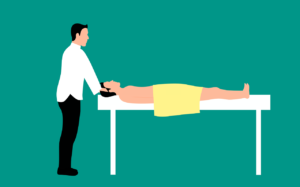
Feeling the discomfort of a stiff neck and shoulder pain as soon as you wake up can really put a damper on your day. But fear not! In this article, we will explore effective methods to alleviate that pesky pain and loosen those tense muscles. Whether you slept in an awkward position or spent hours hunched over your desk, these simple tips will help you find relief, so you can get back to enjoying a pain-free day. So say goodbye to that stiffness and hello to a more relaxed and comfortable you!
Causes of Stiff Neck and Shoulder Pain
If you woke up with a stiff neck and shoulder pain, there can be several possible causes for your discomfort. Understanding the underlying reasons behind your symptoms can help you find the most effective solutions to alleviate the pain. Here are some common causes of stiff neck and shoulder pain:
Muscle strain
One of the primary causes of stiff neck and shoulder pain is muscle strain. This can occur due to overuse or excessive stress on the muscles in the neck and shoulder area. Activities such as lifting heavy objects, poor body mechanics, or sudden movements can strain the muscles, leading to stiffness and discomfort.
Poor posture
Maintaining poor posture consistently, whether during sitting, standing, or sleep, can contribute to neck and shoulder pain. Slouching or hunching forward can cause strain on the muscles and disrupt the natural alignment of the spine. Over time, this can lead to stiffness and discomfort.
Sleeping position
Your sleeping position can also play a role in causing a stiff neck and shoulder pain. Sleeping on a pillow that doesn’t provide adequate support or sleeping in an awkward position can put your neck and shoulder muscles in an unnatural position. This can result in muscle strain and stiffness upon waking up.
Injury or trauma
In some cases, neck and shoulder pain can be a result of injury or trauma. This can occur due to accidents, sports injuries, or sudden impacts to the neck and shoulder area. Injuries such as whiplash or muscle sprains can cause significant discomfort and stiffness.
Symptoms of Stiff Neck and Shoulder Pain
To effectively address your stiff neck and shoulder pain, it’s essential to understand the associated symptoms. These symptoms can vary in intensity and duration depending on the underlying cause. Some common symptoms of stiff neck and shoulder pain include:
Pain and discomfort
Pain and discomfort in the neck and shoulder area are the hallmark symptoms of this condition. The pain may range from mild to severe and can be dull, achy, or sharp in nature. It may also radiate to other parts of the body, such as the arms or upper back.
Limited range of motion
Stiff neck and shoulder pain often lead to a limited range of motion. You may find it difficult to move your neck or shoulders freely, and this restriction can further contribute to discomfort and muscle tension.
Headaches
Headaches are another common symptom associated with stiff neck and shoulder pain. The tension in the muscles can create tension headaches, which are characterized by a dull, constant ache around the temples or the back of the head.
Muscle spasms
Muscle spasms are involuntary contractions of the muscles and can be a result of stiff neck and shoulder pain. These spasms can cause sudden, intense pain and significantly limit your ability to move comfortably.

Diagnosing Stiff Neck and Shoulder Pain
To determine the cause of your stiff neck and shoulder pain accurately, your healthcare provider will perform a thorough evaluation. This evaluation may involve the following diagnostic methods:
Medical history and physical examination
Your provider will begin by asking about your symptoms and medical history. They will inquire about any recent injuries, activities, or habits that may contribute to your pain. Additionally, a physical examination will be conducted to assess the range of motion, tenderness, and muscle strength of the affected areas.
Imaging tests
In some cases, imaging tests such as X-rays, CT scans, or MRI scans may be ordered to get a detailed view of the neck and shoulder structures. These tests can help identify any abnormalities, such as fractures, herniated discs, or degenerative changes that may be causing your symptoms.
Laboratory tests
Although uncommon, your healthcare provider may request certain laboratory tests to rule out any underlying medical conditions that can mimic neck and shoulder pain. Blood tests can be conducted to check for inflammation, infection, or autoimmune disorders.
Specialized tests
In certain situations where a specific cause is suspected, specialized tests may be performed. For example, nerve conduction studies or electromyography (EMG) can assess nerve function and muscle activity, helping to pinpoint the exact cause of your pain.
Home Remedies for Stiff Neck and Shoulder Pain
If you’re dealing with a stiff neck and shoulder pain, there are several home remedies that you can try before seeking medical intervention. These remedies focus on providing relief and promoting healing. Here are some effective home remedies for stiff neck and shoulder pain:
Rest and avoid aggravating activities
Resting the affected area and avoiding activities that aggravate the pain can help promote healing. Take breaks from activities that strain your neck and shoulders, and make a conscious effort to maintain proper posture during daily tasks. Giving your muscles time to recover can often alleviate the stiffness and discomfort.
Apply heat or cold packs
Applying heat or cold packs to the affected areas can provide temporary relief. Heat can help relax the muscles and improve blood circulation, while cold can reduce inflammation and numb the pain. Experiment with both heat and cold therapy to see which provides the most relief for you.
Gentle stretching exercises
Performing gentle stretching exercises can help improve flexibility and relieve muscle tension. Focus on neck and shoulder stretches that target the affected areas. Be sure to avoid any movements that cause pain or discomfort, and always perform the stretches slowly and smoothly.
Over-the-counter pain relievers
Non-prescription pain relievers such as acetaminophen or nonsteroidal anti-inflammatory drugs (NSAIDs) can be effective in reducing pain and inflammation associated with stiff neck and shoulder pain. Follow the recommended dosage instructions and consult a healthcare professional if you have any concerns.

Physical Therapy for Stiff Neck and Shoulder Pain
In cases where home remedies don’t provide satisfactory relief or if the pain persists, physical therapy may be recommended. Physical therapy can help improve the strength, flexibility, and function of the neck and shoulder muscles. Here are some common techniques used in physical therapy for stiff neck and shoulder pain:
Manual therapy techniques
Manual therapy techniques involve the hands-on manipulation of the affected muscles and joints. This can include techniques such as massage, joint mobilization, or soft tissue manipulation. These techniques aim to reduce muscle tension, improve range of motion, and alleviate pain.
Strengthening exercises
Strengthening exercises are essential to stabilize and support the neck and shoulder muscles. The physical therapist will design a customized exercise program targeting the affected areas. These exercises may include resistance training, weightlifting, or the use of resistance bands.
Posture correction
Poor posture often contributes to neck and shoulder pain, so physical therapy will often involve posture correction techniques. This can include postural exercises, ergonomic education, and recommendations for proper body mechanics during daily activities.
Range of motion exercises
Range of motion exercises aim to improve the flexibility and mobility of the neck and shoulder joints. Your physical therapist will guide you through specific exercises that focus on gentle, controlled movements to increase your range of motion and alleviate stiffness.
Medications for Stiff Neck and Shoulder Pain Relief
In some cases, medication may be prescribed to help manage and relieve stiff neck and shoulder pain. These medications can provide temporary pain relief and reduce inflammation. Here are some common medications used for stiff neck and shoulder pain relief:
Nonsteroidal anti-inflammatory drugs (NSAIDs)
NSAIDs such as ibuprofen or naproxen sodium can help alleviate pain, reduce inflammation, and relieve muscle tension associated with stiff neck and shoulder pain. These medications are available over-the-counter or in stronger doses by prescription.
Muscle relaxants
Muscle relaxants may be prescribed to relieve muscle spasms and reduce muscle tension in the neck and shoulder area. These medications work by depressing the central nervous system, causing muscle relaxation. It’s important to follow the dosage instructions carefully, as these medications can cause drowsiness and other side effects.
Corticosteroid injections
In severe cases of stiff neck and shoulder pain, corticosteroid injections may be recommended to provide significant pain relief and reduce inflammation. These injections are administered directly into the affected area and are usually performed under the guidance of imaging techniques, such as fluoroscopy.
Narcotic pain medications
Narcotic pain medications are generally reserved for severe cases of neck and shoulder pain that don’t respond to other treatment options. These medications, often containing opioids, are potent pain relievers and should only be used under close medical supervision due to their potential for dependence and side effects.

Alternative Therapies for Stiff Neck and Shoulder Pain Relief
In addition to conventional treatments, some individuals find relief from stiff neck and shoulder pain through alternative therapies. These therapies focus on holistic approaches to promote pain relief and overall well-being. Some common alternative therapies for stiff neck and shoulder pain relief include:
Acupuncture
Acupuncture involves the insertion of thin needles into specific pressure points on the body. This technique is believed to help restore energy flow and alleviate pain. Many individuals find acupuncture to be an effective complementary therapy for managing neck and shoulder pain.
Chiropractic care
Chiropractic care focuses on the manual manipulation of the spine and joints to alleviate pain and restore proper alignment. Chiropractors may use spinal adjustments, massages, or stretching techniques to address neck and shoulder pain.
Massage therapy
Massage therapy can help relax tense muscles, improve blood circulation, and reduce pain. A skilled massage therapist can target the specific areas of your neck and shoulders that are causing the pain, using various techniques to provide relief.
Transcutaneous electrical nerve stimulation (TENS)
TENS therapy involves the use of a device that delivers gentle electrical impulses to the affected area. These impulses can help disrupt pain signals and provide temporary relief. TENS devices are portable and can be used at home under the guidance of a healthcare professional.
Prevention of Stiff Neck and Shoulder Pain
While it may not always be possible to prevent every instance of stiff neck and shoulder pain, there are steps you can take to minimize the frequency and severity of episodes. Here are some preventative measures to consider:
Maintain good posture
Maintaining good posture throughout the day is crucial to prevent neck and shoulder pain. Sit and stand tall, with your shoulders back and relaxed. Avoid slouching or hunching forward, as this can strain the muscles in your neck and shoulders.
Use an ergonomic workstation setup
If you spend a significant amount of time working at a desk, ensure that you have an ergonomic workstation setup. This includes an adjustable chair, a desk at the appropriate height, and a computer monitor at eye level. Using an ergonomic keyboard and mouse can also help reduce strain on the neck and shoulders.
Stretch and strengthen muscles regularly
Regular stretching and strengthening exercises can help maintain the flexibility and strength of the neck and shoulder muscles. Incorporate exercises that target these areas into your daily routine to reduce the risk of stiffness and discomfort.
Avoid prolonged static positions
Try to avoid maintaining the same position for extended periods, whether sitting or standing. Take regular breaks to move and stretch, especially if you work in a sedentary job. Even small movements can prevent muscle stiffness and promote optimal blood circulation.
When to Seek Medical Attention
In most cases, stiff neck and shoulder pain can be managed with home remedies, physical therapy, and over-the-counter medications. However, there are instances where medical attention should be sought. If you experience any of the following symptoms, it’s important to consult with a healthcare professional:
Severe or worsening pain
If your pain becomes severe or progressively worsens, despite using home remedies and over-the-counter medications, it’s essential to seek medical attention. This could indicate a more serious underlying condition that requires prompt evaluation and treatment.
Loss of motor or sensory function
The sudden loss of motor or sensory function, such as weakness, numbness, or tingling in the arms or hands, should not be ignored. These symptoms may indicate nerve compression or damage and require immediate medical assessment.
Accompanied by other concerning symptoms
If your stiff neck and shoulder pain is accompanied by other concerning symptoms, such as difficulty swallowing, dizziness, or unexplained weight loss, it’s crucial to consult with a healthcare professional. These symptoms may be unrelated or indicative of an underlying medical condition that requires further evaluation.
Inability to perform daily activities
If the pain and stiffness in your neck and shoulders significantly limit your ability to perform daily activities, it’s important to seek medical attention. Your healthcare provider can assess the severity of your symptoms and provide appropriate treatment options to improve your quality of life.
Conclusion
Dealing with stiff neck and shoulder pain can be uncomfortable and disruptive to your daily life. However, by understanding the causes, symptoms, and treatment options available, you can take proactive steps to find relief. Whether it’s through home remedies, physical therapy, medications, or alternative therapies, there are various approaches to address your pain. Remember to consult with a healthcare professional for an accurate diagnosis and personalized treatment plan. With the right care and self-care practices, you can alleviate your stiff neck and shoulder pain and regain your comfort and mobility.







